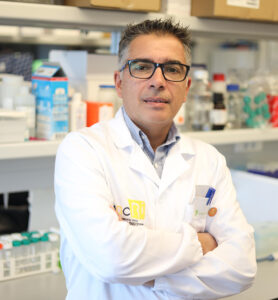EPIGENETICS IN HUMAN DISEASE
Epigenetics is known as “science of change” where its underlying mechanisms are responsible to switching genes on and off. Running, eating or even sleeping can promote chemical modifications around certain genes making them active or inactive. Importantly, and contrary to genetic mutations, “epimutations” are reversible and therefore can be very appealing as therapeutic targets. Epigenetic regulation is involved in the development of several diseases like cancer, autoimmune diseases and other chronic diseases.
The overall objectives of the Epigenetics and Human Disease Laboratory are to analyze epigenetic signatures and explore their potential role in aging, multiorgan dysfunction syndromes and cancer development, adding diagnostic and prognostic value in order to help designing therapeutic approaches in an era of personalized medicine. The work is primarily focused on human cancer and sepsis with emphasis on basic research on human tissue and cells with a strong clinical association.

Pedro Castelo-Branco
Principal Investigator







